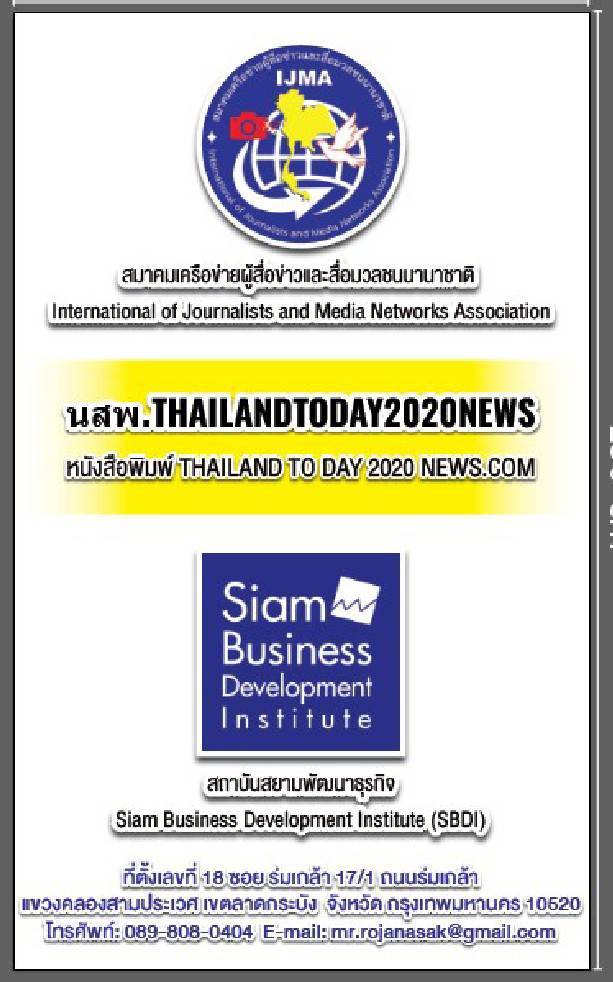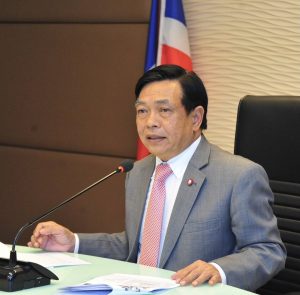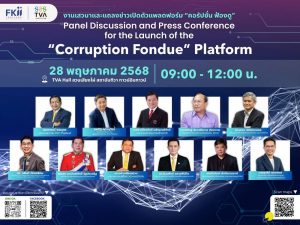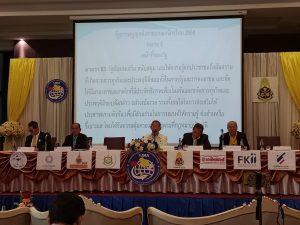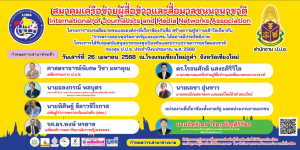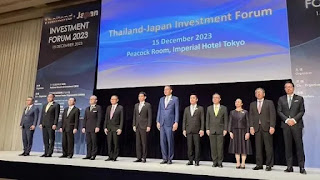
นายกฯ โชว์วิชั่นต่อหน้า 500 นักธุรกิจญี่ปุ่น ย้ำสัมพันธ์ 136 ปี ชวนลงทุนแลนด์บริดจ์ (THAI/ENG)
“เศรษฐา” นำทีมบินไปโตเกียวประชุมสุดยอดอาเซียน-ญี่ปุ่น ถกบิ๊กธุรกิจค่ายรถยนต์ ก่อนพบหารือนายกฯ ญี่ปุ่น และเข้าเฝ้าฯ “สมเด็จพระจักรพรรดิ-สมเด็จพระจักรพรรดินี” ด้าน “เลขาฯ บีโอไอ” ตั้งเป้าไทยเป็นฮับสำนักงานใหญ่ในภูมิภาคของบริษัทชั้นนำโลก จับเข่า 40 นักธุรกิจญี่ปุ่น ชวนลงทุนโปรเจกต์แลนด์บริดจ์ งานสัมมนา “Thailand-Japan Investment Forum” ที่จัดโดยสำนักงานคณะกรรมการส่งเสริมการลงทุน(บีโอไอ) มีนายปานปรีย์ พหิทธานุกร รองนายกฯและรมว.การต่างประเทศ นายสุริยะ จึงรุ่งเรืองกิจ รมว.คมนาคมเข้าร่วมงานด้วย โดยมีนายไซโต รวมถึงนักลงทุนจากญี่ปุ่นเข้าร่วมงานกว่า 500 คน ซึ่งเป็นการสัมนาใหญ่ระหว่างสองประเทศด้านเศรษกิจครั้งแรกหลังสถานการโควิด-19 คลี่คลาย
นายเศรษฐา กล่าวขอบคุณและถือเป็นโอกาสอันดีที่จะได้กล่าวถึงนโยบายเศรษฐกิจและการพัฒนาที่รัฐบาลไทยเร่งดําเนินการ เพื่อเสริมสร้างการเติบโตทางเศรษฐกิจและยกระดับศักยภาพการแข่งขันของประเทศไทยในเวทีโลก โดยไทยและญี่ปุ่นมีความสัมพันธ์ทางการทูตอันดีและยาวนานกว่า 136 ปี ซึ่งตลอดเวลาที่ผ่านมา ความสัมพันธ์ของทั้ง 2 ประเทศได้พัฒนาก้าวหน้าขึ้นทุกมิติ ทั้งด้านเศรษฐกิจ การค้า การลงทุน และสังคม ดังนี้
1.คือความสัมพันธ์ของทั้งสองประเทศระหว่างไทยกับญี่ปุ่นที่มีกว่า136 ปี เป็นมิตรแท้ที่มีความสัมพันธ์กันในทุกระดับ ทั้งราชวงศ์ รัฐบาลและภาคธุรกิจไปถึงภาคประชาชน มีบริษัทญี่ปุ่นลงทุนในไทยกว่า 6,000 บริษัท มีชาวญี่ปุ่นในไทย 80,000 คน
2. รัฐบามีแนวทางในการผลักดันเศรษฐกิจไทย วันนี้รัฐบาลมีแนวทางกระตุ้นเศรษฐกิจภายในประเทศ ทั้งเศรษฐกิจใหม่ เศรษฐกิจดิจิทัล เศรษฐกิจสีเขียว อุตสาหกรรมเอไอ การวิจัย และพัฒนาสตารท์อัพให้เติบโตในเวทีโลก ซึ่งสอดคล้องกับนโยบายญี่ปุ่นที่เน้นเทคโนโลยีคุณภาพเป็นมิตรกับสิ่งแวดล้อม ตั้งแต่บริษัทใหญ่ไปจนถึงบริษัทท้องถิ่น หวังว่าไทยจะเป็นจุดมุ่งหมายของพวกท่าน แม้เศรษฐกิจไทยจะชะลอตัว แต่รัฐบาลมีมาตรการกระตุ้น อัดเงินเข้าระบบ ดึงดูดนักท่องเที่ยว โครงสร้างพื้นฐาน ด้านการค้าญี่ปุ่นเป็นคู่ค้าลำดับต้น เชื่อว่าขยายได้อีกครอบคลุมสินค้าได้หลากหลาย ด้านการลงทุนมีโครงการบีโอไอส่งเสริม 4000 โครงการ การลงทุนญี่ปุ่นมีส่วนผลักดันให้เศรษกิจไทยโตอย่างสต่อเนื่อง ขอขอบคุณนักลงทุนญี่ปุ่นที่ให้ความสำคัญกับประเทศไทย เป็นเวลา 50 ปีที่อุตสาหกรรมญี่ปุ่นขับเคลื่อนเศรษฐกิจไทย เราไม่ลืมและสนัรบสนุนให้แข่งขันเติบโตได้เพื่อเปลี่ยนผ่านไปสู่เทคโนโยยีใหม่ และส่งเสริมซอฟเพาเวอร์สู่ระดับสากล ด้วยการทูตเชิงวัฒนาธรรม พัฒนา 1 ครอบครัว 1 ซอฟต์พาวเวอร์ต่อยอดภูมิปัญหา เป็นโอกาสต่อยอดของญี่ปุ่นในการพัฒนา เกมส์ ภาพยนต์ หรืออนิเมชั่น ซึ่งเชื่อมั่นว่าความพร้อมด้าน Creative Industry ของไทยไม่เป็นรองใคร พิสูจน์ได้โดยรางวัลต่างๆทั่วโลกที่สร้างด้วยฝีมือคนไทย
ด้านอุตสาหกรรมพลังงาน ไทยมีเป้าหมายในการเป็นกลางทางคาร์บอนในปี 2050 และการปล่อยก๊าซเรือนกระจกสุทธิเป็นศูนย์ในปี 2065 จึงเป็นอีกหนึ่งโอกาสที่ขอเชิญชวนญี่ปุ่นเข้ามามีส่วนร่วมในการพัฒนาอุตสาหกรรมนี้ไปด้วยกัน โดยประเทศไทยมีความพร้อมด้านพลังงานสะอาด (Clean Energy) และกำลังต่อยอดอุตสาหกรรมเกี่ยวเนื่อง เช่น Green Hydrogen ที่จะกลายเป็นแหล่งพลังงานแห่งอนาคต
3. ด้านแผนพัฒนาโครงสร้างพื้นฐานที่สําคัญของไทย รัฐบาลให้ความสำคัญกับการลงทุนในโครงสร้างพื้นฐานด้านการขนส่งอย่างเต็มรูปแบบ ทั้งทางถนน ทางน้ำ ทางราง และทางอากาศ ยกระดับระบบคมนาคมขนส่งของ โดยมีหลายภาคส่วนที่มีความร่วมมือกับทางญี่ปุ่น ซึ่งนอกเหนือจากการพัฒนาโครงสร้างพื้นฐานในเขตพัฒนาพิเศษภาคตะวันออกอีอีซีแล้ว ขณะนี้รัฐบาลยังมุ่งมั่นที่จะผลักดันโครงการสะพานเศรษฐกิจเชื่อมทะเลฝั่งอ่าวไทยและอันดามัน (แลนด์บริดจ์)ให้เกิดขึ้นอย่างเป็นรูปธรรม มูลค่าเงินลงทุนเบื้องต้นกว่า 4 ล้านล้านเยน เพื่อสร้างเส้นทางการค้าการขนส่งใหม่ของโลกที่เชื่อมโยงมหาสมุทรแปซิฟิกและมหาสมุทรอินเดีย ด้วยท่าเรือ ระบบราง และระบบถนน ทำให้ไทยเป็นศูนย์กลางการค้าที่สำคัญของภูมิภาคและระดับโลก จึงขอเชิญชวนให้ภาคเอกชนญี่ปุ่นเข้าร่วมศึกษาและลงทุนในโครงการแลนด์บริดจ์ เสริมสร้างความเชื่อมโยงและซัพพลายเซนในภูมิภาคให้มีประสิทธิภาพมากยิ่งขึ้น
“สุดท้ายนี้ ผมในนามรัฐบาลไทยให้ความเชื่อมั่นว่า รัฐบาลมุ่งมั่นจะยกระดับเศรษฐกิจ พัฒนาโครงสร้างพื้นฐาน เดินหน้าขยายการเจรจาเอฟทีเอ กับประเทศต่าง ๆ ทั่วโลก และเร่งปรับปรุงบริการภาครัฐเพื่อทำให้การประกอบธุรกิจมีความสะดวกมากยิ่งขึ้น ซึ่งวันนี้ประเทศไทยเปิดกว้างสำหรับการลงทุนจากทุกประเทศ โดยเฉพาะอย่างยิ่งนักลงทุนจากญี่ปุ่น ซึ่งเป็นนักลงทุนรายใหญ่รายสำคัญของไทยในช่วงหลายสิบปีที่ผ่านมา ไทยพร้อมสนับสนุนการลงทุนจากญี่ปุ่นทั้งรายเดิมและรายใหม่ และพร้อมร่วมมือกับภาครัฐและเอกชนญี่ปุ่นในการยกระดับอุตสาหกรรม เพื่อเปลี่ยนผ่านไปสู่เศรษฐกิจใหม่ ตอบสนองต่อความเปลี่ยนแปลงของโลก เพื่อความก้าวหน้าของทั้งสองประเทศต่อไป” นายเศรษฐา กล่าว
ด้านนายไซโต กล่าวปาฐกถา ตอนหนึ่งว่า ประเทศญี่ปุ่นกับประเทศไทยเป็นพันธมิตรสำคัญร่วมสร้างห่วงโซ่อุตสาหกรรมมาโดยตลอด มีอุตสาหกรรมยานยนต์เป็นหลักบนพื้นฐานความไว้วางใจที่สั่งสมมายาวนานของทั้งสองประเทศ ปีนี้ครบรอบ 50 ปี แห่งมิตรภาพญี่ปุ่นอาเซียน ความร่วมมือที่ผ่านมาได้สะสมความร่วมมือและสร้างความสัมพันที่แน่นแฟ้นมาโดยตลอด เพื่อสร้างอนาคตร่วมกันในอีก50 ปีข้างหน้า โดยจะมุ่งเน้นใน 3 ประเด็น คือการสร้างอุตสาหกรรมในอนาคต เปิดสายงานที่ญี่ปุ่นถนัด เช่น พลังงานสะดาด รถยนต์ในยุคต่อไป การบินและอวากาศ รวมถึงการแพทย์ขึ้นสูง ความมั่นคงด้านพลังงานและลดคาบอนไปพร้อมกับการพัฒนาด้านเศรษฐกิจ ซึ่งหวังว่าการประชุมครั้งนี้จะผลักดันความร่วมมือให้เป็นรูปธรรมในการลดคาบอน เพราะญี่ปุ่นกำลังดำเนินการกับไทยอยู่หลายโครงการ และสามคือการพัฒนาบุคคลที่เป็นพื้นฐานความร่วมมือเพื่อสร้างอนาคต มีการเริ่มโครงการแลกเปลี่ยนนักธุรกิจรุ่นเยาว์ เพื่อให้มีความสัมพันธ์ร่วมกันเหมือนที่เรามีความสัมพันธ์ทางเศรษฐกิจที่มั่นคงและความไว้วางใจซึ่งกันและกันตั้งแต่รุ่นก่อน
นายไซโต กล่าวว่า อย่างไรก็ตามในส่วนของอุตสาหกรรมยานยนต์ผู้ผลิตญี่ปุ่นได้เข้ามาไทยในช่วงปี 1960 ตั้งแต่นั้นมา 60 ปี มีการสร้างงานร่วมกันในอุตสาหกรรมนี้อย่างมั่นคง แต่วันนี้อุตสาหกรรมยานยนต์มีการเปลี่ยนแปลงครั้งใหญ่ มีการลงทุนของสหรัฐอเมกาและจีนเพิ่มมากขึ้น การแข่งขันระดับโลกทวีความรุนแรง ญี่ปุ่นต้องการให้อาเซียนโดยเฉพาะไทยที่ถูกขนาดนามว่าดีทรอยต์อาเซียนที่แข็งแกร่ง เป็นที่สร้างยานยนต์ในยุคต่อไปเพื่อให้แข่งขันในโลกได้ เพราะนอกเหนือจากรถยนต์ไฟฟ้าแล้ว ยังมีรถยนต์ไฮโดเจน และเอสทานอล เราต้องพัมนาในเรื่องเหล่านี้ และต้องจับตาดูการเปลี่ยนแปลงอุตสาหกรรมรถยนต์ทั่วโลกและพัฒนายานยนต์เชิงกุลยุทธ์ และจับตาตลาดส่งออกยุโรป ที่ต้องการลดคาร์บอนในกระบวนการผลิต ซึ่งเราต้องตอบสนองในเรื่องดังกล่าว และอยากทำงานให้ครอบคลุมกับประเทศไทย โดยร่วมมือกับนายเศรษฐา และรัฐบาลไทยสนับสนุนอุตสาหกรรมยานยนต์ของสองประเทศ และเร่งสร้างศูนย์การผลิตและการส่งออกรถยนต์อันดับหนึ่งของโลกในยุคต่อไป และไม่ใช่แค่รถยนต์แต่ยังจะทำงานแข็งขันเพื่อกระชับความสัมพันธ์การลงทุนของทั้งสองประเทศในด้านต่างๆด้วย
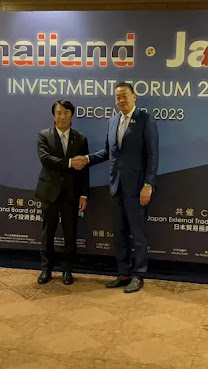
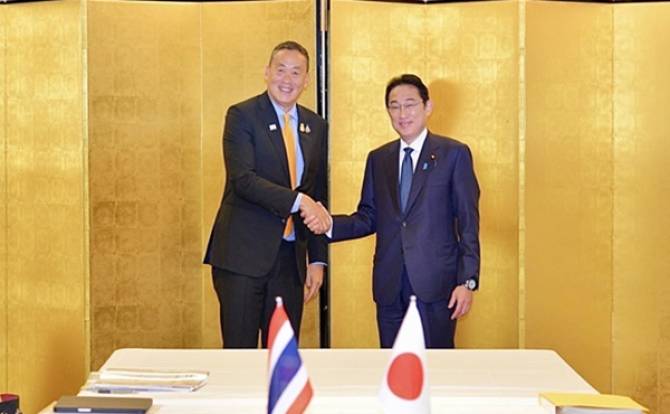
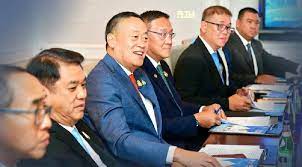
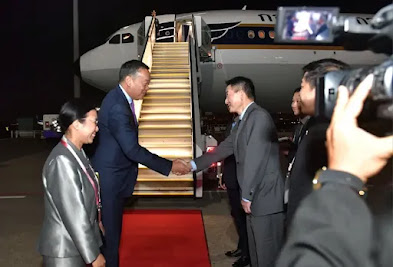
The Prime Minister has shown his vision in front of 500 Japanese businessmen, reiterating 136 years of relationship, inviting investment in Landbridge.
“Setha” led the flight team to Tokyo for the ASEAN-Japan summit. Before discussing Japanese Prime Minister and meeting with Her Royal Highness “Emperor-Her Majesty the Queen” on “Secretary BOI”, Thailand is aiming to be a hub of regional headquarters of world’s leading companies. A Japanese businessman asked to invest in the Landbridge project.
The seminar “Thailand-Japan Investment Forum” organised by the Board of Investment (BOI) was attended by Mr. Panpree Phittanukorn, Deputy Prime Minister and Minister.Foreign Affairs Suriya Jungrungruengkit, Minister of Foreign AffairsMr. Saito and more than 500 Japanese investors attended the event, which was the first meeting between the two countries after the COVID-19 situation, said Mr. Setha, thank you and it is a good opportunity to talk about Thailand’s economic and development policies. To promote economic growth and enhance Thailand’s competitiveness on the global stage. Thailand and Japan have enjoyed good diplomatic relations for 136 years. Over the past year, relations between the two countries have developed in all areas of economy, trade, investment and society as follows:
1.The 136-year relationship between Thailand and Japan is a true friendship of all levels, from royal family, government and business to the public sector. More than 6,000 Japanese companies have invested in Thailand, with 80,000 Japanese.
2. The government is working to stimulate the Thai economy. Today, the new economy, digital economy, green economy, AI industry, research and start-up development are in line with Japan’s policy of environmentally friendly technology from major companies to local companies. Despite the slowdown in the Thai economy, the government has introduced funds to attract Japanese tourists. Japan’s trade infrastructure is expected to expand further. In terms of investment, 4000 BOI projects have been launched and Japanese investment has continuously contributed to Thai economic growth. For 50 years, the Japanese industry has been driving the Thai economy and encouraging competition to transition to new technology and promote software to international level. With development diplomacy, one family of 1 family of 1 soft power is an opportunity for Japan to develop games, movies or animation. Thailand is second to none. Proven by various awards around the world made by Thai people.
Thailand’s energy industry aims to be carbon neutral by 2050 and net greenhouse gas emissions by 2065. This is another opportunity for Japan to participate in the development of this industry. Thailand has clean energy. And is building on related industries such as Green Hydrogen that will become the energy source of the future.
3. As for Thailand’s major infrastructure development plan, the government is focusing on full-scale investment in transportation infrastructure including roads, water, rail and airways. There are many sectors that have cooperated with Japan in addition to the EEC Special Development Zone. The government is also committed to a concrete economic bridge project linking the Gulf of Thailand and Andaman (Land Bridge) with an initial investment of more than 4 trillion yen to build a new world trade route linking the Pacific and Indian oceans with ports, rail systems and roads, making Thailand a major regional and global trading hub. We would like to invite the Japanese private sector to study and invest in the Landbridge project, strengthen connectivity and supply in the region.
“Finally, on behalf of the Thai government, I am confident that it will continue to enhance the economy, develop infrastructure and expand FTA negotiations with countries around the world. And improve government services to facilitate business operations. Thailand is open to investment from all countries, especially Japanese investors. Over the past decades, Thailand has supported both existing and new Japanese investments and cooperated with the Japanese public and private sectors to upgrade its industries. This will help us to move forward into a new economy in response to global change for the future progress of both countries,” said Mr. Setha.
Mr. Saito said that Japan and Thailand have always been key partners in building the industrial chain based on long-standing trust between the two countries. This year marks the 50th anniversary of Japanese ASEAN friendship. Next year, we will focus on three areas: building future industries in Japan, such as automotive power, aviation and airspace, medical high rise, energy security and carbon reduction along with economic development. We hope this meeting will drive concrete cooperation in reducing carbon because Japan is working on many projects with Thailand. The third is to develop people who are the basis for future-building cooperation. Young businessmen’s exchange programs have been launched to have the same mutual relationships that we have with each other since generations ago.
What did Mr. Saito say?Japan’s auto industry has entered Thailand in the 1960s. Since then, 60 years have been firmly established. But today the automotive industry has changed dramatically, with US and Chinese investment increasing. Global competition intensifies. Japan wants ASEAN especially Thailand to be dubbed a strong ASEAN Detroit. This is the next generation of automobiles to compete in the world. Apart from electric cars, there are also hydrogen and ethanol cars. We need to look at global car industry changes and develop strategic vehicles and European markets that need carbon reduction. We would like to work closely with Mr. Setha and the Thai government to support the automotive industry of the two countries and accelerate the construction of world’s number one car manufacturing and export centre, not just cars but also investment relations.

